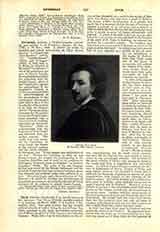

Duvernay, LUDGER.—a French-Canadian journalist and patriot, b. at Verchères, Quebec, January 22, 1799; d. November 28, 1852. A printer by trade, he founded and edited successively at Three Rivers, Quebec, “La Gazette des Trois-Rivières” (1817), “Le Constitutionnel” (1823), and “L’Argus” (1826). In 1827, with A. N. Morin, he founded in Montreal “La Minerve”, one of the prominent papers of French Canada. He was imprisoned (1832) for protesting with Dr. Daniel Tracey, editor of the “Vindicator”, against the arbitrariness of the Legislative Council. A medal was presented him in acknowledgment of his devotedness to the public good. Duvernay’s chief title to fame is the foundation of the Society of St. John the Baptist (1834). The choice of the Precursor for the patron saint of the French-Canadians accorded with a time-honored tradition mentioned in the Jesuit “Relations” (1646) as contemporary with the beginning of New France and inherited from the mother country. The maple leaf, now accepted by Canadians of every origin, was chosen as the national emblem and the motto adopted by Duvernay was: “Notre langue, nos institutions et nos loin”. Elected for Lachenaie in 1837, he was forced to leave the country for participating in the Canadian Rebellion, and he took up his residence at Burlington, Vermont, where he founded “Le Patriote Canadien” (1849). The union of the two Canadas having been voted by the British Parliament and the principle of representative government adopted, peace was restored and political exiles were allowed to return. Duvernay began again the publication of “La Minerve”, in which he extolled the introduction of responsible government, and criticized the Act of Union destined, by its authors, to absorb Lower Canada.
LIONEL LINDSAY

